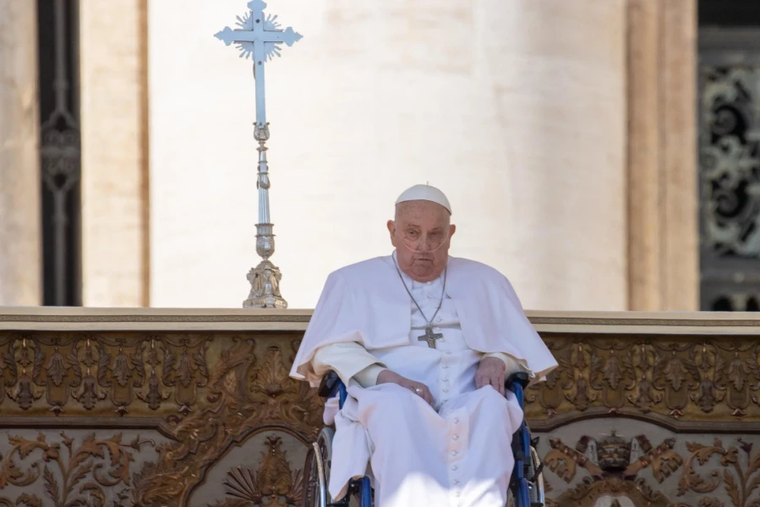Pope Francis Makes Appearance at Jubilee of Sick, Reflects on Own Illness, Sickbed as a Holy Place
Wearing nasal cannulas that provide supplemental oxygen, Pope Francis arrived in a wheelchair accompanied by a nurse. According to Vatican officials, before greeting the faithful, the Pontiff ‘received the sacrament of reconciliation in St. Peter’s Basilica, prayed, and passed through the Holy Door.’

Still recovering from bilateral pneumonia that hospitalized him for nearly 40 days, Pope Francis made a surprise appearance in St. Peter’s Square on Sunday for the Jubilee of the Sick, sharing profound reflections on suffering, care, and the transformative power of illness.
Wearing nasal cannulas that provide supplemental oxygen, Pope Francis arrived in a wheelchair accompanied by a nurse.
Hundreds of faithful gathered in St. Peter’s Square on April 6, receiving him enthusiastically around 11:45 a.m. local time.
In his homily for the Jubilee of the Sick and Healthcare Workers, which was read aloud by Archbishop Rino Fisichella as the Pope continues his recovery, Francis drew inspiration from the prophet Isaiah and the day’s Gospel reading to explore the spiritual dimensions of illness and healing.
“The sickbed can become a holy place, where charity burns away indifference and gratitude nourishes hope,” the Holy Father emphasized in his prepared text, offering a deeply personal perspective on his recent illness.
The 88-year-old Pontiff invited the faithful to contemplate the Israelites’ situation in exile, as Isaiah described. “It seemed that all was lost,” Francis noted, but added that it was precisely in this moment of trial that “a new nation was being born.” He connected this biblical experience to the woman in the day’s Gospel reading who had been condemned and ostracized for her sins.
“Her accusers, ready to cast the first stone, were halted by the quiet authority of Jesus who told her ,‘Go your way. You are free. You are saved,’” the Pope’s homily explained.
In comparing these stories, Pope Francis emphasized that God does not wait for our lives to be perfect before intervening. “He enters into our wounds. He knocks at our door, not despite our suffering, but because of it,” the homily stated.
Turning directly to those experiencing illness and those who assist them, the Pope acknowledged the profound suffering illnesses can bring. “It can make us feel like the people in exile ... or like the woman in the Gospel,” he said, but continued that illness can also become “a place of encounter, a ‘school’ in which we learn to love and be loved with humility and grace.”
The Holy Father then reflected on his own recent illness and consequent dependence on others, describing it not as a burden but as a lesson in trust, gratitude and hope. “Let us not push back,” he counseled, adding: “Let us allow ourselves to be loved.”
Pope Francis thanked them for their work in a particularly moving passage directed to health-care professionals. He encouraged them to receive every patient as an opportunity to renew their sense of humanity. His words acknowledged the challenges facing medical workers, including inadequate working conditions and even instances of aggression against them.
Bringing his address to a close, the Pontiff recalled the words of his predecessor, Pope Benedict XVI, who reminded the Church that “the true measure of humanity is determined in relation to suffering.” Francis warned that “a society that turns its back on the weak becomes cruel and inhuman.”
The Holy Father urged all present to resist the temptation to marginalize and forget the elderly, ill, or those weighed down by life’s hardships. “Let us not banish suffering from our surroundings,” he implored. “Let us not exclude those who are frail.” Instead, he called for God’s love to transform suffering into “a space of communion and growth.”
‘I Feel the Finger of God’
In his brief Angelus remarks following the Mass, the Pope shared his personal experience: “Dearest ones, as during my hospitalization, now during my convalescence I feel the ‘finger of God’ and experience his loving caress.”
The Pope also called for prayers for all who suffer and for health-care professionals, urging investment in “necessary resources for care and research, so that health-care systems may be inclusive and attend to the most fragile and poor.”
Pope Francis concluded with a plea for peace in conflict zones, including Ukraine, Gaza, the Middle East, Sudan, South Sudan, the Democratic Republic of Congo, Myanmar and Haiti.
According to Vatican officials, before greeting the faithful, the Pontiff “received the sacrament of reconciliation in St. Peter’s Basilica, prayed, and passed through the Holy Door.”
The Holy See has not yet commented on whether Pope Francis will participate in Holy Week ceremonies, with the Vatican press office indicating that “it is premature to discuss this” and assuring that further details will be provided later.
- Keywords:
- pope francis health















